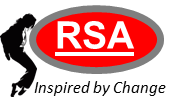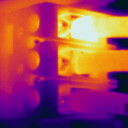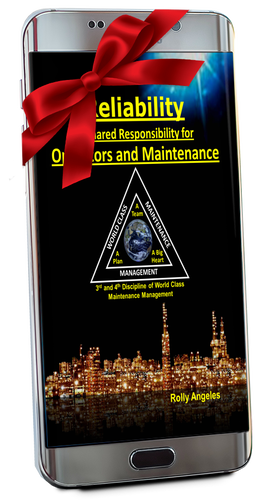

RSA Online E-Book Store
These books are written for maintenance people in industries seeking better ways of improving their equipment and assets. If you are living the day to day pressures of doing maintenance, then these books are written for you.
My Mission
Reliability - A Shared Responsibility for Operators and Maintenance (E-book Readable Verson)
This is the 3rd of a series of books on World Class Maintenance Management which covers the partnership between operators and maintenance in industries and why this is important. For as long as operators and maintenance in industries remain a separate function, Industries will continue to be reactive. My goal is to reach out to industries and convince them that these two cannot co-exists without each other and that it is time for both operators and maintenance to finally work together to improve not only the productivity but also the Reliability of their equipment and assets. Separating these two only creates feuds and friction between them. In most cases, the problems in industries remain deeply rooted in their organization, from how their organization was structured, their policies, procedures they wrote, and the rules they imposed upon their employees. This book may sound contradictory to many of the policies industries imposed, and all I ask from the reader is to finish reading this book so that the reader can understand my reasons behind the contradiction. Some highlights of this book include:
-Why Operators are Important in the Reliability Strategy
- What Maintenance is all About
- Survey on Top Problems of Preventive Maintenance Revisited 2018
- Why Preventive Maintenance cannot prevent "ALL" failures
- Why Safety cannot be First
- Operations and Maintenance - Will the Feud Ever Stop?
- Reducing Human Errors in Maintenance
- Why Operations and Maintenance Went their Own Separate Ways
- Understanding Human Errors
- The Common Thing RCM and TPM Both Believes
- Strengthening Operator and Maintenance Partnership
- Detailed Guidelines in Implementing 7 Steps of Autonomous Maintenance
- Tips in Implementing Autonomous Maintenance
- Detailed Guidelines in Implementing the 4 Phases of Planned Maintenance
- Tips in Implementing Planned Maintenance
- Why Do Most RCM Initiatives Fail?
- Detailed Guidelines in Implementing RCM Analysis for Equipment
- Tips in Implementing the RCM Analysis
- Detailed Guidelines on How to Perform Root Cause Failure Analysis Probe
- Tips in Implementing Root Cause Failure Analysis
- Guidelines in Conducting Equipment FMEA/FMECA
- Tips in Implementing FMEA/FMECA
- Small Problems matters most
- The Biggest Missing Link in Any Reliability Strategy
- Changing the Image of the Maintenance Function
- It Will Definitely Take Time for Industries to Accept
- The Separation Needs to End, and a Partnership Needs to Begin
- Managing Human Errors in Maintenance
- How to Strengthen Operators and Maintenance Partnership
- Tips and Guidelines in Implementing TPM Focused Improvement and many more.
One of the biggest problems in most industries is the separation between both operators and maintenance. Due to this, operators just remain switch flickers and are frequently provided with a job description to operate the equipment. This book explains that operators are always the first line of defense on any equipment-related failures and breakdowns since they are the closest people that will experience the failure first before maintenance. Operators need to understand the earliest symptoms of failures. One sentiment from maintenance is that if breakdowns happen simultaneously, what they think is that they are undermanned. Maintenance people are not undermanned; it is simply because operators are not involved in the shared responsibility of doing maintenance.
Rolly, your people-focus on reliability improvement and your commitment to helping people grow through improving their understanding of equipment and of themselves come through loud and clear in the book. The workplace stories you tell will resonate with people working in operations and maintenance in every industry. I very much like that you have provided practical answers with explanations and examples of how companies can move up the path to world-class maintenance performance. You have written about TPM, RCM, and RCA with great passion and an obvious depth of knowledge and experience. I’ve learned much more about the right way to use those tools by reading your book than I ever understood before. There is no doubt that the World Class Maintenance Management - The 12 Disciplines book will become a well-thumbed reference book for me. Rolly, I’ve been fortunate to come across you and value your honest perspectives and insights on doing maintenance right. I share your desires for what maintenance can become and do for a company and hope that we can combine our efforts in the future.

This new book published in May 2020 is by far the most comprehensive maintenance management book written to date. That includes my Handbook of Maintenance Management. In 344 pages he lays out the history of maintenance management and the state of the art today. Rolly has deep experience and understanding in both RCM and TPM (an unusual combination) which adds depth to the discussion. He includes a detailed and practical glossary of keywords and their meanings. I want to make a few specific points. The assessment tool is great, and I will definitely upgrade my own assessment tool with his improvements. It covers all aspects of managing maintenance. Asset management: This is one of the best introductions to asset management and detailed rundown of ISO 5500X I've read. It shows through examples of how asset management can help the organization's effectiveness. Life cycle management is certainly part of asset management. In this case, the life cycle discussion shows definitively how most of the reliability is not under the control of the maintenance function. He says that reliability is a company's responsibility. Good graphics on the iceberg of costs to own and run a machine. Good maintenance practices may require a change in the corporation. The section on change management is well thought out and complete. Congratulations on publishing what will become the standard text in the field.

This book contains significant and relevant theory and idealism. I never read this kind of book before but it hits the core value of TPM. It is indeed maintenance quite necessary in any kind of manufacturing company. I salute for all technicalities which I don’t know it comes from before, I have learned a lot from this book. As technical personnel, I can say that it’s very much informative and vibrant. It makes a lot of sense in dealing with the alternative way of maintenance. All throughout, I was amazed by the author’s knowledge. Proud being a Filipino. Thank you for sharing this kind of book with us the author is really a mastermind on this TPM world. I absolutely enjoyed reading it even though I’m not really a reading enthusiast. I miss the Rolling Stone part which you gave the color on this book. Kudos Mr. Rolly Angeles for a good job. I now truly understand and felt being one of the maintenance team. This book has a heart and is very lively. I hope you continue to spread the meaningful story of the maintenance people. We owe you all the knowledge and being a part of this team review. Congratulations Mr. Rolly this is a heck of success. Thank you.

First I want to thank you Mr. Rolly for giving me this very rare opportunity to comment in a book and have my comment in print. At first, I was wondering where would this book lead me? Your quote “changing a system means changing a culture” captured my attention. So as I read, I already knew I need to finish reading this book. I can relate to most of what was illustrated, stated, and example in this book. They’re all true and happening. A reality. I dreamed of having a kind of maintenance organization such as those described. My only worry is that I am not in the position to implement such. It is true that this kind of approach should be top to bottom, no support from upper management means you’ll end up to nothing. I am a maintenance guy and proud to be one. But it is great to know somebody that dedicates too much time and adheres to improve the lives of maintenance people like Rolly Angeles.

The Author

Rolly Angeles
store owner
Rolly is a seasoned international maintenance and reliability consultant with over 30 years of solid experience in the field. He has been invited to different countries and has conducted reliability and maintenance training in United Arab Emirates, Qatar, India, Malaysia, Indonesia, Brunei, Thailand, Nigeria, Bangladesh, South Africa, China, and Botswana. His portfolio of maintenance training includes maintenance and reliability courses on TPM, Lubrication, Tribology, Condition-Based Maintenance, RCM, RCFA, Planned Maintenance, World Class Maintenance Management, The 12 Disciplines, Oil Contamination Control, Maintenance Indices and KPI’s, Maintenance and Reliability Management Strategies and much more. Rolly previously worked with Amkor Technology Philippines, as a TPM Senior Engineer, an industry engaged in the manufacture of Integrated Circuit products and spearheaded their Planned Maintenance organization which composed of maintenance managers and engineers.
With 30 years of solid experience, he had worked in various industries from shipping, woodworking, foundry, cast-iron machining, assembly lines, semiconductor manufacturing, and mining industry. Here was where he gained hands-on experience and understanding of both TPM and RCM respectively, a strategy from both the west and the east. His last corporate employment was in 2002 where he worked as a technical training specialist at Lepanto Consolidated Mining Industry. In 2005, Rolly retired early from the industry and decided to establish his own consulting business, RSA Reliability and Maintenance Consultancy Firm where he dedicates his time and passion to work as a maintenance consultant. He provides in-house training, consultation, and facilitation to different industries on maintenance and reliability’s best practices.
